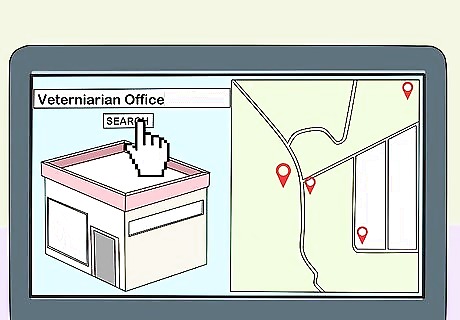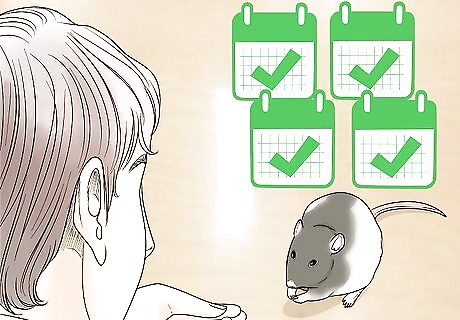
views
X
Research source
As such, finding the right vet can be important to ensure you have the right help if something goes wrong.
Locating Your Nearest Rat Veterinarians

Ask your breeder or local pet store. Whether you’re getting ready to buy your rat or already have, check with your source to see if they know who specializes in rats nearby. If they are accustomed to taking care of rats, they may have done the research already!

Search online or in a phonebook for nearby vets. You will want to have a nearby vet if possible in case of emergencies. However, if you cannot find any, it is still worth knowing how far it is to the nearest professional. Start your search for small-animal or “exotic” vets in particular, as they will be the ones with rat experience. However, you will likely have to do some calling to be sure of specialties. You can also try researching via special interest groups (i.e. rat owner’s groups online) or by asking friends and colleagues. You never know who might know someone who knows someone!

Call each veterinary office to ask about rats specifically. Most vets handle the major animals—dogs, cats, birds, and horses. However, you should ask if they have experience with working with rats in particular. This will give you an idea of how familiar they are with common illnesses for your pet. If they don’t have rat experience, see if they have other small rodent experience. This may be your best bet if you can’t find someone else. You can also take this opportunity to ask if they know of any vets that specialize in rats or have that experience. Vets will typically know who the other vets nearby are and what they work with.

Check your vet’s certifications. In the United States, vets are required to receive a Doctorate in Veterinary Medicine. Additionally, there are only a few dozen schools that are accredited by the American Veterinary Medical Association. You should also check if your state has specific licensure requirements that your vet should meet. You can directly ask your vet about their certifications or check their website online. Unfortunately, you must be a member of the AVMA to access their directory of members.

Document your vet’s contact information and hours. Store your vet’s number, address, and business hours in your phone or somewhere near your pet rat. This way you have the information handy in case it is needed. You also need to search for pet hospitals that are open outside of your vet’s hours in case they are unavailable. Some vets will offer an emergency number, which you need to get, too. Just ask your vet for recommendations.
Making an Initial Appointment

Call and make an appointment with your vet. This will be your opportunity to visit with the vet directly and see how they work with your pet. Prepare by writing out your rat’s daily routine, eating and sleeping schedule and any other quirks specific to your little one.

Discuss any concerns you have during your visit. Make sure to ask questions about your pet to gauge the vet’s confidence, such as, “What types of food are best for my rat?” You aren’t looking to catch the vet in not knowing something about rats; you just want to see that your animal is in good hands. You also want to walk through your typical routine to make sure you are doing what’s best for your pet. Be sure you like the vet generally as well. As with any other type of doctor, you want to like the person in charge of taking care of your loved one.

Make a follow-up appointment 4-6 months down the road. Although rat life expectancy isn’t incredibly long—typically 2-3 years—you should go ahead and schedule another checkup. The more often your rat is checked on by a professional, the better your chances of catching any issues early on.
Keeping on Top of Your Rat's Health

Perform weekly checkups yourself. Keep an eye out for changes in habits and appearance. Things that are especially out of the ordinary may warrant a trip back to the vet. Look at your rat’s eyes, feet and fur in particular. Discharge from the eyes or ears, cuts on the feet, and loss of fur are all warning signs that your pet needs help from the vet. If you rat is injured, be quick to assess the damage. You might call ahead to the vet if you are unsure whether or not it is worth bringing them in.

Make your routine checkups every 4-6 months. Just as you yourself should visit a doctor periodically to make sure things are going as they should be, taking your rat to the vet is a good way to stay aware of your rat’s health. Keep track of non-routine visits as well to make sure your pet doesn’t go too long without a wellness check.

Do your research before a problem occurs. By reading books and online articles about rat health, you can be better prepared should something happen. This will also help you to know how to react—whether you need a trip to the vet or just a quick call. Your local library can be a great starting place for research. Since the internet can be more filled with opinions or experiential knowledge, it is sometimes wiser to go directly to a published source. If you are especially keen, you can discuss resources with your vet directly. This will give you the opportunity to be on the same page—literally—as they are. However, don’t take having read similar material as becoming an expert yourself. Trust your vet to know best.
















Comments
0 comment